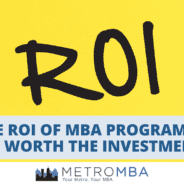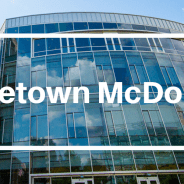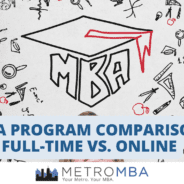Search results for :
How Work Experience Helps Open MBA Doors
This post has been republished in its entirety from original source clearadmit.com
With so many factors to consider when approaching business school, some candidates may not be fully prepared to address the question of work experience. Sure, GMAT scores and GPAs are key, but what’s so important about a résumé? Applying to business school isn’t the same as applying for a job. Or is it? Continue reading…
Wharton Professor Explores Importance of Workplace Culture
Adam Grant, professor of management and psychology at the Wharton School of Business, recently wrote an op-ed piece in the New York Times entitled, “The One Question You Should Ask About Every Job.”
Grant covers issues surrounding work, values and motivation for the paper.
Does Working for the Family Business Hurt Your MBA Potential?
Family Business and the MBA
Working for the family business can be an incredibly rewarding and fulfilling experience. Building a family legacy through succession that will last for generations is the main goal of many family businesses. Continue reading…
Neeley Professor Releases Study on Communication Technology and Workplace Happiness
Recent advances in communication technology have made it possible for humans to be connected at all times, with family, friends, and companies. These developments are often lauded, but there is a negative side to the increase in connectivity. Continue reading…
Haas MBAs Work With Fellows to Drive Innovation
Three MBA candidates at the Haas School of Business were recently given the opportunity to work with Gunso Kim, secretary general of the World eGovernment Organization of Cities and Local Governments, to try and develop a ride-sharing app like Uber or Lyft that would function in Seoul, South Korea. The project was highlighted in a recent press release from Haas looking at the fellows appointed by the Garwood Center for Corporate Innovation, of whom Kim is one. The Garwood Center promotes the open innovation idea that organizations should look both internally and externally to optimize innovation. Other fellows of the program include Dr. Mohi Ahmed, Todd Schofield, Ram Shanmugan and Philipp Skogstad. Continue reading…
Cass Entrepreneurs Network Event Focuses on “Unbundling the Bank”
The future significance of banks in society is in the hands of millenials, an audience at Cass Business School heard last week. Cass Entrepreneurs Network hosted a fintech event, entitled “Unbundling the Bank” on April 9th (in conjunction with Chinwag) to discuss disruption in the banking sector.
An expert panel, chaired by Ben Rooney (Co-Editor-in-Chief of tech news site Informilo), debated whether financial innovation is likely to be driven by the banks, start-ups, or through partnerships between them.
The panel agreed that the output of banks’ on-going digital transformation will depend on the extent to which they are seen as trusted by both millennials and, crucially, regulators.
Continue reading…
Anderson Hosts EMBA Info Session and App Tips Workshop
Anderson School of Management will be hosting an information session for its Executive MBA program. The information session will be followed by an application tips workshop for EMBA students. The events will be held April 4. The information session will be held from 8 to 9:30 a.m. and the application tips workshop will begin at 9:30 a.m. Registration for both events should be completed online prior to the events.
The EMBA information session will give prospective students the opportunity to join current EMBA students and the Director of Admissions for breakfast. The event will be held at the Executive Divining Room at UCLA Anderson. Prospective students will hear more about the EMBA program, admission process and what an Executive MBA degree from Anderson can do for your career.
Schools in Houston Metro Area Become Haven for Energy Workers
It’s undeniable that the energy sector all over the country is going through some changes. Last month 20,193 jobs were cut, according to the outplacement firm Challenger, Gray & Christmas, Inc.
While those numbers might seem glum, there is some hope on the horizon. It seems many of these refugees are headed for business schools to pursue MBA degrees. According to the Wall Street Journal, Rice University’s Jones Graduate School of Business and University of Texas at Austin’s McCombs School of Business have reported increases in applications for their two-year full-time MBA programs from energy-sector candidates. Continue reading…
Should MBA Applicants Make a Campus Visit?
Making a campus visit to your target business school lets you kill two birds with one stone. You’re showing the Admissions Committee (adcom) your commitment to and interest in their particular program, which could score you points in the application process, and you’re doing yourself a priceless favor by seeing the institution firsthand. These visits can take place within several months of the deadline or the week of the deadline; but, ideally, apply having already made the visit rather than intending to make the visit. What you learn in the process could shape and inform your application more than you think. Continue reading…
San Fran State Offers M&A Workshop
The San Francisco State University College of Business is hosting an Innovations in Making Mergers and Acquisitions Workshop on Thursday, August 14, 2014. The program will be held at the San Francisco State University downtown campus, on the sixth floor.
Attendees will learn from experts and share insights with other attendees that are engaged in Marketing and Acquisitions programs. Program attendees will learn the human, cultural, and organizational factors that matter most in eventual M&A success, minimize employee distraction from performance during M&A and how to maximize commitment to the new organization, see how culture clash between parties can actually be used to enhance M&A performance, share your experiences with experienced M&A experts and others with similar issues and opportunities, apply lessons learned from the workshop directly to your M&A program and smartly manage integration planning and implementation to realize desired synergies and build a new organization that is truly more than the sum of its parts.
Business Schools Should Think of Students As Customers, According to BU Dean
When Kenneth W. Freeman became the Dean of the Boston University School of Management, a colleague told him that business school students are the university’s products. However, Dean Freeman believes that students are actually the university’s customers, as he recently explained in an article in Businessweek.
Business schools are facing decreases in the number of applications they receive and challenges from other models of business education. Potential students are questioning the return on investment from a business school education, since the economy is weak and the cost of tuition is increasing. Some employers are beginning to question the utility of a business school degree compared to other backgrounds. Dean Freeman believes that business schools will have to fundamentally alter the “customer experience” of management education to convince potential students and employers that an MBA is worth the investment.
Dean Freeman hopes that Boston University can transform itself to become more appealing to students using the core principle of transformation: “engage the entire organization in creating a memorable mission and translate it into an active strategy.” Freeman says that faculty members often perform outstanding individual work within business schools, but that they are not often mobilized to work to reshape the entire business school.
This is the 100th anniversary of the founding of Boston University’s School of Management, and the faculty have launched a transformation of the school’s undergraduate and graduate business curricula. Dean Freeman believes that transformation can be achieved through a focus on faculty members’ and students’ desires to make a difference in the world. Freeman envisions a curricula for Boston University that emphasizes the influence business can have on society and the development of innovative and ethical leadership. The faculty intends to make BU’s School of Management preeminant in sustainability, social enterprise, health and life sciences, and digital technology. Faculty have also worked to develop an ethical focus throughout the curriculum, and have implemented innovations in teaching and learning. Freeman believes that these factors appeal to the student as a customer: “We can best serve our student-customers by putting them at the center of an experience that moves outward from the classroom to the community and the world while taking value—in all its senses—into account.”
New Stern Center Hosts Discussion on Workplace Safety in Bangladesh
The new Center on Business and Human Rights at New York University’s Stern School of Business held its first major convening since its March 2013 opening. The conference focused on workplace safety in the garment industry of Bangladesh. Manufacturers, senior government officials from Bangladesh, US and European retailers, Western government officials, intergovernmental organizations, and experts came together to discuss potential improvements to the Bangladesh garment industry.
The topic of workplace safety in Bangladesh has been a major subject among representatives of the international garment industry and human rights experts after a series of devastating tragedies in Bangladeshi factories, including the collapse of the Rana Plaza Factory building which killed 1,129 people in April 2013 and a factory fire in Dhaka that killed over 100 people in November 2012. The tragedies have brought major US and international retailers, like WalMart, Gap, American Apparel, and J.C. Penny under fire from some consumers and government officials for failing to ensure safety for workers in the factories that manufacture their clothing.
The representatives who gathered at Stern talked about the economics of sourcing between different organizations in the clothing supply chain, regulations for the garment industry, and the role of Western organizations in ensuring workplace safety abroad. The experts also discussed attempts by intergovernmental organizations, retailers, and the government to improve garment industry regulations in Bangladesh. The Center for Business and Human Rights will prepare a report on workplace safety and lead a follow-up meeting in Bangladesh in 2014.
The Center on Business and Human Rights prepares NYU business students to face human rights challenges that could affect the operations of their future companies. More broadly, the center also considers what companies should do to respect human rights in their operations, and studies what companies have successfully done to advance human rights. The Center on Business and Human Rights is the first human-rights oriented center at a business school.

Temple Hosts First TechConnect Idea to Invoice Workshop
On April 26, two dozen graduate students and faculty representing Temple University’s business, law, engineering and medical schools convened for the inaugural TechConnect Idea to Invoice Workshop. The workshop, which was a joint effort of the Fox School’s Innovation and Entrepreneurship Institute and Temple’s Office of Technology Development, aimed to foster collaboration among students with different backgrounds through teamwork and to increase the number of successful business ideas that are conceived of and commercialized at the university.
The overarching goal of TechConnect is to educate innovators who lack a business background with the skills and knowledge they need to successfully pitch strong business plans to potential investors and research organizations. According to Assistant Professor Andrew Maxwell, “most technology developers, including those I have met at Temple, don’t understand the commercialization process and how market considerations should influence the technology development itself…You have to be able to look at business issues from the beginning.”
Event participants together introduced seven technologies they developed prior to the workshop. After discussing these ideas, four were selected to move beyond concept to a development phase. To apply their newly acquired business acumen, students discussed the value propositions, potential growth plans and go-to-market strategies of these proposed ideas. Following the workshop, some of the more promising teams started to complete feasibility studies and draft grant applications.
The next TechConnect is tentatively scheduled for the last week in August.
The ROI of MBA Programs: Is It Worth the Investment?
Pursuing a Master of Business Administration (MBA) has long been considered a pathway to career advancement, higher earnings, and leadership roles in the corporate world. However, as tuition costs continue to rise and the job market evolves, the return on investment (ROI) of an MBA program has become a critical consideration for prospective students. This article delves into the various factors that influence the ROI of an MBA, exploring both the tangible and intangible benefits, as well as the potential risks involved.
Understanding ROI in the Context of an MBA
ROI is a financial metric used to evaluate the profitability of an investment. In the context of an MBA, ROI is typically calculated by comparing the costs of the program (tuition, fees, and lost income) with the financial gains (increased salary, bonuses, and career advancement) that accrue after graduation. However, a comprehensive assessment of ROI should also account for intangible benefits, such as enhanced skills, networking opportunities, and personal development.
The Tangible Benefits of an MBA
- Increased Earning Potential: One of the most cited reasons for pursuing an MBA is the potential for a significant salary increase. According to the Graduate Management Admission Council (GMAC), MBA graduates often see a substantial salary bump compared to their pre-MBA earnings. For example, graduates from top-tier programs can expect starting salaries in the range of $120,000 to $150,000 or more, which is a considerable increase over the median salary of bachelor’s degree holders.
- Career Advancement: An MBA can open doors to higher-level positions that may have been inaccessible otherwise. Many MBA programs offer specialized tracks (e.g., finance, marketing, entrepreneurship) that equip students with the expertise needed for specific roles. Additionally, the degree often serves as a credential that signals to employers that the candidate possesses a strong foundation in business principles, strategic thinking, and leadership.
- Networking Opportunities: MBA programs are known for their extensive alumni networks, which can be invaluable for career advancement. These networks provide access to industry professionals, potential employers, and business partners. The relationships forged during an MBA program can lead to job opportunities, mentorship, and even entrepreneurial ventures.
The Costs of an MBA
- Tuition and Fees: The cost of an MBA program can vary widely depending on the institution, with top-tier programs often costing upwards of $100,000. In addition to tuition, students must also consider the costs of books, supplies, and other fees. For many, the financial commitment required to pursue an MBA is significant, and paying for it often involves taking on student loans.
- Opportunity Cost: The opportunity cost of an MBA is another crucial consideration. Full-time MBA students typically forgo one to two years of income while in school, which can add up to a substantial sum, especially for those who were earning a high salary prior to enrollment. Part-time and executive MBA programs mitigate this cost by allowing students to continue working while studying, but these options may extend the time required to complete the degree.
- Post-Graduation Debt: Graduating with student debt can impact the overall ROI of an MBA. While increased earnings can help pay off loans, the burden of debt repayment can linger for years, potentially offsetting some of the financial gains.
Intangible Benefits of an MBA
- Skill Development: An MBA program offers a rigorous curriculum that hones essential business skills, such as strategic thinking, leadership, communication, and analytical abilities. These skills are not only valuable in traditional corporate roles but also in entrepreneurial endeavors and non-profit management.
- Confidence and Credibility: Earning an MBA can boost confidence and credibility, both personally and professionally. The knowledge gained, combined with the prestige of the degree, can enhance one’s self-assurance in making business decisions and taking on leadership roles.
- Personal Growth: The MBA experience often challenges students to step outside their comfort zones, confront new ideas, and develop a global perspective on business. This personal growth can lead to a more fulfilling career and life overall.
Calculating and Maximizing Your MBA ROI
To calculate the ROI of an MBA, individuals should estimate the total costs of the program (including tuition, fees, and lost income) and compare this to the projected increase in earnings over time. Online ROI calculators specifically designed for MBA programs can help with this process.
To maximize ROI, prospective students should consider the following:
- Choosing the Right Program: The reputation and ranking of the MBA program can significantly impact ROI. Graduates from top-tier programs often command higher salaries and enjoy stronger job placement rates. However, regional programs or specialized MBAs may offer better returns depending on the industry and geographic location.
- Leveraging Alumni Networks: Actively engaging with the program’s alumni network can lead to valuable job opportunities and career advancement. Attending networking events, seeking mentorship, and participating in alumni activities can enhance the overall value of the MBA.
- Considering Part-Time or Online Options: For those concerned about the opportunity cost, part-time or online MBA programs allow students to continue working while earning their degree. This approach can reduce the financial strain and maintain career momentum.
Conclusion
The ROI of an MBA program is multifaceted, encompassing both tangible financial gains and intangible personal and professional benefits. While the upfront costs can be substantial, many graduates find that the long-term rewards—higher salaries, career advancement, and enhanced skills—justify the investment. However, achieving a positive ROI requires careful planning, including selecting the right program, managing costs, and leveraging the opportunities an MBA offers. Ultimately, the decision to pursue an MBA should align with one’s career goals, financial situation, and personal aspirations.
Hybrid MBA
Rice University Hybrid MBA Program Structure
Rice’s Hybrid MBA is for working professionals in Texas and beyond. Students spend one weekend a month on campus and benefit from the convenience of online classes the rest of the time. Hybrid students must complete 54 credit hours and will complete their MBA degree in 22 months.
Online learning occurs through both live remote sessions and asynchronous content. All live remote classes are held on Thursday evenings.
The Hybrid program also features three one-week immersions. The first immersion kicks off the program in July, featuring launch activities and in-person classes. The second immersion is offered in June at the close of the first year, with in-person classes. The third immersion is the Global Field Experience, a high-impact challenge allowing students to get international consulting experience. Students work in small teams to complete consulting projects with local companies and non-profits.
Our residency program, included in tuition, helps students develop meaningful connections with each other. The entire cohort stays at the same hotel close to Rice during on-campus weekends.
Curriculum
Hybrid students earn the same MBA as Rice Business’ other top-ranked programs and share the same world-renowned professors and innovative, rigorous curriculum.
All core courses within the Hybrid MBA are either nearly 100% in-person or a combination of in-person and online. No courses are 100% online.
Just like other Rice programs, during the first year of the Hybrid program, students embark on the Global Field Experience (GFE), a hands-on international project that’s part of the core curriculum. Working in small teams, students tackle real business challenges for local companies and non-profits, gaining practical insights and making a meaningful impact.
In the second year, students can take nine electives (choosing from 100+ options), including popular courses like Managing Energy Transitions, The New Enterprise, Corporate Rivalry, genAI: Strategy and Innovation, and Scandals and Reputation Management. Students can mix and match evening electives, weekend electives or daytime electives.
Rice University Hybrid MBA Rankings
# 1 Graduate Entrepreneurship – Princeton Review and Entrepreneur Magazine, 2020, 2021, 2022, 2023, 2024
#7 Best Part-Time MBA Program – Fortune, 2024
#15 Best Part-Time MBA Program – U.S. News and World Report
#5 Best MBA for Finance – Princeton Review, 2023, 2024
Class Profile
The first cohort of Hybrid MBA students (the Class of 2025) has 29 students. 28% are female and 52% are from underrepresented minority groups. Students have an average of eight years of work experience and the average GPA is 3.3.
Tuition, Scholarships and Financial Aid
The two-year tuition for Rice’s Hybrid MBA is $135,000. The tuition covers the complete 22-month schedule of coursework and residency at a hotel close to campus. An enrollment deposit of $2,500 is due upon acceptance and will be applied toward the first-semester bill. Many students supplement their tuition costs through company financial support from their employer. Students can also cover tuition costs with Federal Financial Aid, Federal Student Loans and private loans.
Rice University Hybrid MBA Admissions
To be considered for admission to the Rice Business Hybrid MBA Program, applicants must complete the following steps for application:
Complete an online application, required personal essays, and a professional resume.
You must also submit a standardized test score for admission to the program (GMAT or GRE).
You’ll need to submit one confidential, professional recommendation from a current or previous supervisor. If you don’t have one from your supervisor, you should submit two confidential recommendations highlighting your professional abilities.
There is a $200 application fee payable online or by check.
Class of 2027 Hybrid MBA Application Deadlines
| DECISION ROUND | APPLICATION DEADLINE | DECISION DATE |
| Round 1 | October 14, 2024, 11:59 PM CT | Applications will be evaluated for admission on a rolling basis. |
| Round 2 | January 6, 2025, 11:59 PM CT | |
| Round 3 | March 10, 2025, 11:59 PM CT | |
| Round 4 | April 28, 2025, 11:59 PM CT | Applications will be evaluated for admission on a space-available basis. |
Georgetown University’s McDonough School of Business Q&A with M.S. in Environment and Sustainability Management Program Director, Dr. Kerrie Carfagno
Dr. Kerrie Carfagno, the Program Director for the M.S. in Environment and Sustainability Management at Georgetown McDonough, recently sat down with MetroMBA to share insight into the M.S. Program.
MetroMBA: How does this program differentiate from other offerings at your school and other programs in the GME space?

Dr. Kerrie Carfagno, Program Director MS-ESM
Dr. Carfagno: The M.S. in Environment and Sustainability Management (MS-ESM) program is a STEM designated interdisciplinary degree offered through the Graduate School of Arts and Sciences, Earth Commons Institute, and McDonough School of Business at Georgetown University. This interdisciplinary approach provides a unique curriculum that combines the principles of environmental science with a foundation in business management. Our program operates on a cohort model, meaning students learn from each other and their professors as they complete the 11-month program in the same classes on campus. A unique attribute about our program is the cohort tends to skew more female with 80% of the current cohort identifying as such.
MetroMBA: What is the typical profile of a student who would benefit most from this program and what characteristics are your admissions team looking for?
Dr. Carfagno: We take a holistic approach when reviewing applications for admission to MS-ESM. We look for students who are eager to learn and make a positive impact, have a passion for sustainability and the environment, and a collaborative mindset that embodies the Georgetown spirit. Typical students who benefit most from this program tend to fall under three categories: recent graduates, career changers, and life-long learners. Recent graduates have a strong interest and academic background in either natural sciences or business. They are looking to develop their skills in the environment and sustainability management space further before entering the workforce. Students that fall into the career changers category are looking to switch from their current industry to sustainable management. And finally, life-long learners are those who currently work in a position related to sustainability and want to continue their education to be industry leaders in the field.
MetroMBA: What types of financial aid are available to students?
Dr. Carfagno: The MS-ESM program provides partial, merit-based scholarships to qualified candidates. While the scholarships do not fully fund the program, they do provide partial tuition coverage assistance. All students are automatically considered for the partial, merit-based scholarships at the time of their application submission.
Additionally, as a stem-designated masters program, there are plenty of outside funding opportunities students can pursue as well.
MetroMBA: How does your school assist in finding job opportunities and how does your program enhance a student’s profile as a job applicant?
Dr. Carfagno: The MS-ESM degree furthers one’s knowledge of sustainability and combines principles of environmental science with a foundation in business management, which can help prepare one for a variety of jobs within most industries. Throughout the program, students have the opportunity to work with a career management professional. Students work directly with the Assistant Director of MS-ESM Career Management to identify career paths, discuss career goals and receive career coaching to elevate networking and interviewing methods. Students have exclusive access to one-on-one career coaching appointments, workshops and career sessions tailored to support them in developing an effective job search strategy. They may also access many resources at the Graduate Career Center within the Graduate School of Arts & Sciences, as well as attend select career events offered through the McDonough School of Business Career Center.
MetroMBA: What is one insider tip you can provide prospective applicants about applying to this program?
Dr. Carfagno: An insider tip when applying to this program would be to make sure your passion for environment and sustainability shows through in your application. We are interested in knowing where your passion for the field stems from and how you will help bring about change to help solve the pressing environmental issues affecting our world today.
Lightning Round
What is one restaurant every student must visit and why?
The Tombs is a classic in the Georgetown neighborhood. It’s delicious and they have great deals throughout the week. Georgetown students love to spend time there after classes and on the weekends.
Where is the best cup of coffee on campus?
The best cup of coffee on campus can be found in our library at Midnight Mug. The Midnight Mug is a community space and coffeehouse where students can take a break from studying and hang out with friends and professors in a relaxed atmosphere.
What is the best ‘hidden secret’ on campus?
The best ‘hidden secret’ on campus would be the Heyden Observatory and gardens. The observatory is one of two Georgetown buildings included in the national register of historic places in the United States. It’s a beautiful space where you have fantastic views of DC and the overall campus.
Read more about the Georgetown MS-ESM here.
Demystifying MBA Costs: How Much Does an MBA Program Really Cost?
Are you considering pursuing an MBA but concerned about the financial commitment it entails? The cost of an MBA program is a crucial factor to consider, and in this article, we’ll provide you with a comprehensive breakdown of MBA costs, including tuition, fees, and potential hidden expenses. By the end of this guide, you’ll have a clearer understanding of what to expect and how to plan for your MBA journey.
Understanding MBA Tuition
The largest chunk of your MBA expenses will be tuition fees. The cost of tuition can vary significantly depending on the school, location, and program type (full-time, part-time, online, or executive). On average, top-tier MBA programs in the United States can cost anywhere from $100,000 to $200,000 or more. However, there are also more affordable options available, including part-time and online MBA programs that can cost significantly less.
Additional Fees
In addition to tuition, MBA programs often have various fees that you should be aware of. These may include:
- Application Fees: When applying to MBA programs, you’ll typically need to pay application fees, which can range from $50 to $200 per school.
- Books and Course Materials: Don’t forget to budget for textbooks and other course materials, which can add up to a few thousand dollars over the duration of your program.
- Housing and Living Expenses: If you’re attending an on-campus program or relocating for your studies, you’ll need to factor in housing and living costs, which can vary widely based on location.
- Health Insurance: Some MBA programs require students to have health insurance, and this cost should be considered.
- Extracurricular Activities: While not mandatory, participating in clubs, conferences, and networking events may incur additional costs.
Financial Aid and Scholarships
The good news is that there are various financial aid options available to help offset MBA costs. Many universities offer scholarships, grants, and assistantships to qualified students. Additionally, federal and private student loans are options to consider, although it’s important to be mindful of the long-term financial implications.
ROI and Career Opportunities
While the upfront cost of an MBA can be significant, it’s essential to evaluate the return on investment (ROI) and long-term career opportunities it can offer. Many MBA graduates experience substantial salary increases and accelerated career growth, which can outweigh the initial expenses.
Budgeting and Planning
To manage MBA costs effectively, create a detailed budget that accounts for tuition, fees, living expenses, and any potential debt repayment. Consider your own financial situation and explore financing options such as employer sponsorship or part-time work while studying.
Conclusion
In conclusion, the cost of an MBA program varies widely, but it’s an investment in your future that can lead to substantial career benefits. By understanding the breakdown of MBA costs and planning strategically, you can make an informed decision that aligns with your career goals and financial circumstances. Remember to research individual programs, explore financial aid opportunities, and budget wisely to make the most of your MBA journey.![]()
MBA Program Comparison: Full-Time vs. Online MBA Programs
Pursuing a Master of Business Administration (MBA) is a pivotal milestone in your professional journey, but the path you choose can dramatically affect your experience. At MetroMBA, we understand the importance of this decision, which is why we’re here to provide you with an in-depth MBA program comparison, focusing on the key distinctions between full-time and online MBA programs. Let’s explore these options in detail, so you can make an informed choice.
Flexibility and Convenience
Full-Time MBA Programs:
- Full-time MBA programs demand your full attention, making them ideal if you’re committed to an immersive on-campus experience.
- These programs follow a fixed schedule, often requiring you to be on-site, which may necessitate relocation.
- Suited for those who can dedicate themselves entirely to their studies and embrace the traditional campus atmosphere.
Online MBA Programs:
- Flexibility is the hallmark of online MBA programs, allowing you to set the pace while balancing work, family, and education.
- Geography becomes irrelevant as online programs enable participation from anywhere in the world, making them a stellar choice for those unable to relocate.
- With the freedom to choose when and where you study, online MBA programs cater to professionals seeking to advance their careers without sacrificing their current roles.
Networking Opportunities
Online MBA Programs:
- Online programs offer unique networking opportunities through virtual discussion boards, forums, and video conferencing, connecting you with peers and faculty.
- These programs often foster a diverse global network, providing a broader spectrum of perspectives.
Full-Time MBA Programs:
- Full-time MBA programs excel in providing extensive in-person networking opportunities through classroom interactions, collaborative group projects, and immersive extracurricular activities.
- On-campus events, career fairs, and robust alumni networks play pivotal roles in securing internships and job opportunities.
Cost
Online MBA Programs:
- Online programs are typically more cost-effective than full-time MBA programs due to lower tuition fees and reduced expenses related to housing and commuting.
- The option to continue working while pursuing an online MBA can be a significant financial advantage.
Full-Time MBA Programs:
- Full-time MBA programs often come with higher tuition fees and living expenses. However, they may counterbalance this through more substantial financial aid opportunities, scholarships, and assistantships.
- Consider the opportunity cost of not working during a full-time MBA program when evaluating the overall expenses.
Learning Experience
Online MBA Programs:
- Success in online programs depends on your self-discipline and motivation, with effective time management being paramount.
- Learning materials are available 24/7, offering the flexibility to study at your convenience.
- Some students may find the absence of face-to-face interactions with professors and peers challenging.
Full-Time MBA Programs:
- Full-time programs offer a structured, classroom-based learning experience with direct access to professors.
- In-person classes cultivate vibrant discussions, provide immediate feedback, and create a collaborative learning atmosphere.
- Immersive experiences, such as internships and consulting projects, often form integral components of full-time MBA programs.
When it comes to choosing an MBA program, deciding between full-time and online options is a pivotal step in your academic and professional journey. MetroMBA understands that your decision should align with your unique circumstances, career aspirations, and learning preferences. Online programs offer flexibility and affordability, catering to working professionals and individuals with family commitments. Conversely, full-time MBA programs provide unmatched in-person networking opportunities and traditional campus-based education for those seeking an immersive experience.
As you make your MBA program comparison, consider your capacity for full-time study, your desire for in-person networking, and your budget. Both full-time and online MBA programs offer valuable paths to a prosperous business career, and MetroMBA is here to guide you.![]()
![]()
![]()

















